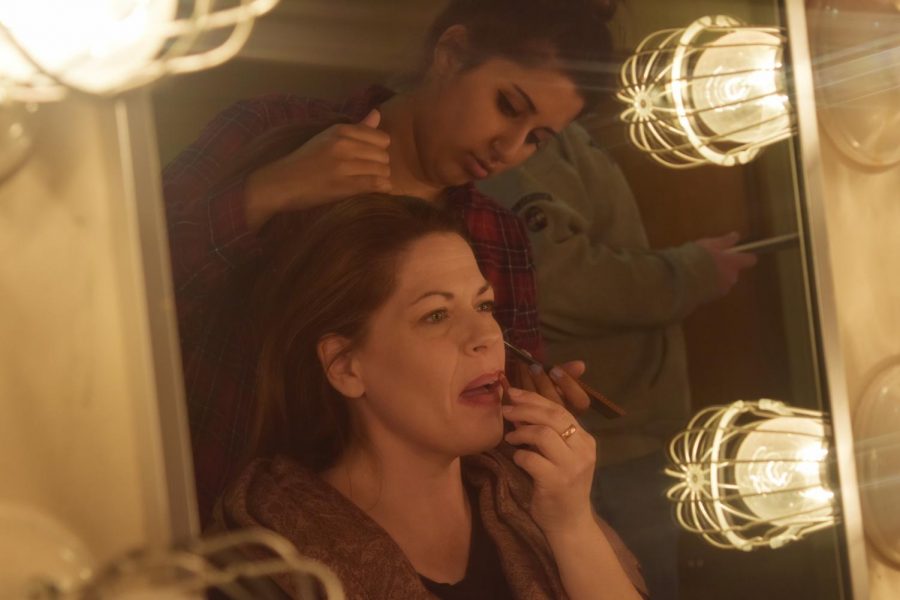Performing Arts prepares final show
‘Silent Sky’ features themes of persevering through adversity, mirrors performers’ attitudes about cuts
MICHAEL LINDER | The Daily Evergreen
Lauren Prasanna, top, prepares hair and makeup for Ann-Jeannette Seymour, an actor in the upcoming “Silent Sky” play.
March 28, 2018
As night fell, a din rose on the third floor of Daggy Hall, where in Jones Theatre the cast and crew of Performing Arts’ last production, “Silent Sky,” were hard at work putting the final touches on the show.
The actors applied makeup and pinned their hair together in dressing rooms while technicians threw paint on the set and readied the lights, preparing to begin rehearsal.
“Silent Sky,” is a story similar to that of “Hidden Figures.” It follows Henrietta Leavitt, an astronomer known for her ideas about the heavens, as she faces an era of which she was well ahead: the early 1900s.
Fighting to rise above her position as a computer, she probes theories during a time of immense scientific revolutions in the understanding of how the world works.
For those in this theater, however, there is a tone different from the usual theater roar – a tone of sadness, of finality and a tinge of anger – as the actors work to put the finishing touches on what will be their last show of the year.
“Because it’s Mary [Trotter]’s last play, I want it to be magnum opus,” said Devin Grey, who plays Peter. “I want this to be as great for her as it can be, so she goes out on top, as a point of the theater and WSUPA has done some amazing things, cutting them is a mistake.”
While both cast and crew share this sentiment, they remain undaunted and continue to work toward making the show the best it can be: Setting hairstyles, ironing costumes and working the set to provide a spectacle that will prepare Performing Arts for its final breath.
The first part of that spectacle is the play itself, one that holds meaning both for its director and actors alike.
“I appreciated Henrietta’s journey, the struggle between work and family, and leaving your family to follow your dream and putting love on hold,” said Mary Trotter, the play’s director and one of the Performing Arts professors leaving at the end of this semester. “It’s a STEM topic, and I thought it would be a good way to get people to the theater, and it’s been good for collaboration.”
One of the major collaborators, Trotter said, was Michael Allen, a senior instructor of physics and astronomy, who helped explain the work and the process that the women portrayed in the play had a hand in.
Trotter explained that Henrietta shares a similar set of circumstances that Performing Arts finds itself in now, which causes her to question everything.
“That’s the one thing Henrietta never lets up on, she’s always questioning,” Trotter said. “That’s what I feel like my last five months have been about, and I have really found this new pursuit of encouraging everyone to question.”
For the cast and show’s director, Henrietta’s struggles are something with which they sympathize.
The set, which consists of the dome of an observatory and the desks that make its purpose possible, includes hundreds of small LEDs that hang from above, blinking like stars.
“We have these stars hung all over the stage that turn on and off at different parts in the play,” Grey said. “As the play goes on and it fades into night, we’re slowly fading them in … it is visually a spectacle.”
Grey said the audience should come in expecting a fantastic show.
“I hope that they always come in expecting quality,” Trotter said. “I think that they should also come to [the] theater expecting to be disappointed they aren’t going to get it anymore.”
The cast also hopes to instill certain themes and messages as the audience heads out of the theater.
“I … want them to leave with a sense of hope that we will grow as humanity by continuing to question and seek our greatest truth,” Trotter said.
Even as Trotter prepares for the end of her time here, she still has the same focus she always has.
“These past five months have been kind of surreal,” she said, “but then I get to go to the theater and I get to rehearse. It’s one of the things that keeps me going. I’m sad that it’s not going to be here, but I’m always going to do the work.”
“Silent Sky” will run at 7:30 p.m. Friday, and 2 p.m. and 7:30 p.m. Saturday. It will play again for Mom’s Weekend on April 6 and 7. Matinees are free for students, but the evening shows cost $8 for students, $8 for seniors and $10 for adults.









